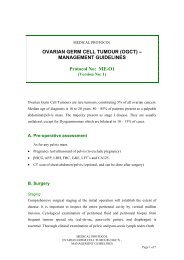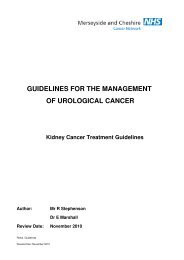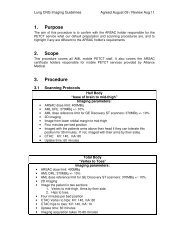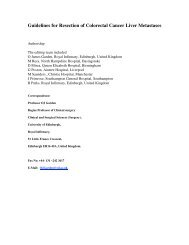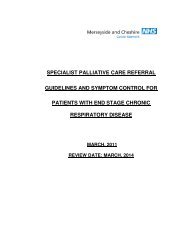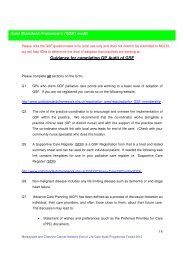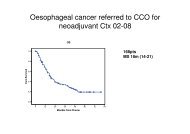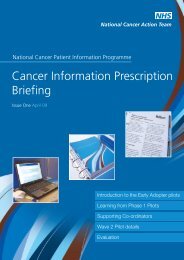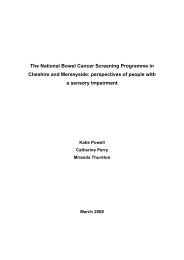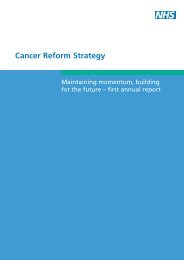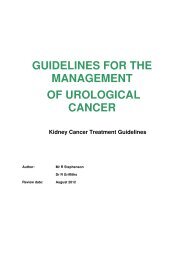Cancer Reform Strategy - NHS Cancer Screening Programmes
Cancer Reform Strategy - NHS Cancer Screening Programmes
Cancer Reform Strategy - NHS Cancer Screening Programmes
- No tags were found...
You also want an ePaper? Increase the reach of your titles
YUMPU automatically turns print PDFs into web optimized ePapers that Google loves.
80 CANCER REFORM STRATEGYWork and cancer5.55 <strong>Cancer</strong> can have a profound impact onpeople’s ability to work. Each year around 90,000people of working age are diagnosed withcancer. Some of these will require protractedperiods of time off work due to the impact ofcancer and its treatment. Some may never beable to get back to work. However, for otherscontinuing to work helps them to cope withwhat they are going through. An individuallytailored approach is therefore needed.5.56 From 2005, cancer patients have beenprotected by the Disability Discrimination Actfrom the point of diagnosis. The Act providespeople with rights in a wide range of areas andplaces a duty on employers, providers ofservices, public authorities and transportproviders not to discriminate against disabledpeople and make reasonable adjustments forthem. In the area of employment, examples ofreasonable adjustments might be allowing anemployee with cancer time off for treatment orrehabilitation, or allowing them some flexibilityin working hours or a phased return to work.Occupational Therapists play an important rolein helping people return to their desiredoccupation. However further work is necessaryto increase employers’ awareness of the role ofcancer within the Act. Although 80% ofemployers are aware of the Act, only 19% knowthat cancer is classed as a disability. 335.57 A recent survey undertaken by Workingwith <strong>Cancer</strong> (a dedicated support group),<strong>Cancer</strong>backup and the Chartered Institute ofPersonnel and Development highlighted theneed for better advice on work related issuesrelating to cancer and its treatment.<strong>Cancer</strong>backup and Working with <strong>Cancer</strong> haveproduced guidance for employers andemployees. Guidance for carers will bepublished early in 2008.Surviving cancer5.59 Macmillan <strong>Cancer</strong> Support defines acancer survivor as someone who has completedinitial treatment and has no apparent evidenceof active disease, or is living with progressivedisease and may be receiving treatment but isnot in the terminal phase of illness, or someonewho has had cancer in the past.5.60 Survivors of cancer have a range ofphysical, psychological, social, spiritual, financialand information needs. At present servicesfrequently do not meet these needs for patientsor are poorly integrated. As many patients withcancer are elderly and have other medicalproblems, services for survivors need to be wellintegrated with those for other long termconditions. This is often best done by GPs andprimary care services.5.61 Problems relating to the after effects oftreatment for cancer can, in some cases, be longlasting and severely debilitating. Examplesinclude lymphoedema (swelling of a limb)following surgery and/or radiotherapy andbrachial plexopathy, which can cause pain andweakness in an arm. Macmillan <strong>Cancer</strong> Support,with funding from the Department of Health iscurrently running an innovative pilot programmeto assess how the needs for care of brachialplexopathy sufferers can best be met.5.62 Follow up by a hospital team has for manyyears been considered to be a standard part ofthe management of a cancer patient. Howeverpatients frequently undergo follow up, both at ahospital and in primary care, but without goodcommunication between the two, leading toduplication of effort and in some cases,confusion.5.63 Hospital follow up is undertaken withseveral objectives. These include:5.58 Commissioners should make sure thatinformation for people who work and havecancer is made available to patients as soonas they are diagnosed. Advice on returningto work should be available for all patientsof working age. Employers should beencouraged to support employees whowish to do so.●●●Detection and management of acutecomplications or side effects of treatment;Early clinical detection of recurrence;Detection of late effects of treatment such aslymphoedema or secondary cancers;



